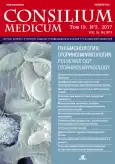The characteristics of pathogenesis and therapy of acute rhinosinusitis in patients with allergic rhinitis
- Authors: Kirdeeva A.I1, Kosiakov S.Y.1
-
Affiliations:
- Russian Medical Academy of Continuous Professional Education of the Ministry of Health of the Russian Federation
- Issue: Vol 19, No 3 (2017)
- Pages: 91-94
- Section: Articles
- URL: https://journal-vniispk.ru/2075-1753/article/view/94855
- ID: 94855
Cite item
Abstract
Full Text
##article.viewOnOriginalSite##About the authors
A. I Kirdeeva
Russian Medical Academy of Continuous Professional Education of the Ministry of Health of the Russian Federationаспирант каф. оториноларингологии ФГБОУ ДПО РМАНПО 125993, Russian Federation, Moscow, ul. Barrikadnaia, d. 2/1
S. Ya Kosiakov
Russian Medical Academy of Continuous Professional Education of the Ministry of Health of the Russian Federation
Email: serkosykov@yandex.ru
д-р мед наук, проф., зав. каф. оториноларингологии ФГБОУ ДПО РМАНПО 125993, Russian Federation, Moscow, ul. Barrikadnaia, d. 2/1
References
- Gwaltney J.M, Phillips C.D, Miller R.D, Riker D.K. Computed tomographic study of the common cold. New Engl J Med 1994; 330 (1): 25-30. doi: 10.1056/NEJM199401063300105.
- Chen C.F, Wu K.G, Hsu M.C, Tang R.B. Prevalence and relationship between allergic diseases and infectious diseases. J Microbiol, Immunol Infect 2001; 34: 57-62.
- Pant H, Ferguson B.J, Macardle P.J. The role of allergy in rhinosinusitis. Cur Opin Otolaryngol Head Neck Surg 2009; 17 (3): 232-8. doi: 10.1097/MOO. 0b013e32832ad3c0.
- Gwaltney J.M.Jr. Acute community - acquired sinusitis. Clin Infect Dis 1996; 23 (1): 1224-5.
- Mogensen C, Tos M. Quantitative histology of the maxillary sinus. Rhinology 1977; 15: 129.
- Alho O.P, Karttunen T.J, Karttunen R et al. Subjects with allergic rhinitis show signs of more severely impaired paranasal sinus functioning during viral colds than nonallergic subjects. Allergy 2003: 58: 767-71.
- Blair C, Nelson M, Thompson K et al. Allergic inflammation enhances bacterial sinusitis in mice. J Allergy Clin Immunol 2001; 108: 424-9. doi: 10.1067/mai.2001.117793.
- Alho O.P, Karttunen R, Karttunen T.J. Nasal mucosa in natural colds: effects of allergic rhinitis and susceptibility to recurrent sinusitis. Clin Experimental Immunol 2004; 137 (2): 366-72. doi: 10.1111/j.1365-2249.2004.02530.x.
- Kauffman H.F, Tomee J.F, van de Riet M.A et al. Protease - dependent activation of epithelial cells by fungal allergens leads to morphologic changes and cytokine production. J Allergy Clin Immunol 2000; 105: 1185-93. DOI: http://dx.doi.org/10.1067/mai.2000.106210.
- Shah S.A, Ishinaga H, Takeuchi K. Pathogenesis of eosinophilic chronic rhinosinusitis. J Inflam 2016; 13: 11. doi: 10.1186/s12950-016-0121-8.
- Prokopakis E.P, Vlastos I.M, Ferguson B.J et al. SCUAD and chronic rhinosinusitis. Reinforcing hypothesis driven research in difficult cases. Rhinology 2014; 52 (1): 3-8. doi: 10.4193/Rhin.
- Karatzanis A, Kalogjera L, Scadding G et al. Severe Chronic Upper Airway Disease (SCUAD) in children. Definition issues and requirements. Int J Pediatr Otorhinolaryngol 2015; 79 (7): 965-8. doi: 10.1016/j.ijporl.2015.02.024.
- Choi C.H, Poroyko V, Watanabe S et al. Seasonal allergic rhinitis affects sinonasalmicrobiota. Am J Rhinology Allergy 2014; 28 (4): 281-6. doi: 10.2500/ajra.2014.28.4050.
- Patel Z.M, Hwang P.H. Uncomplicated acute sinusitis and rhinosinusitis in adults: Treatment. Uptodate. Literature review current through: Jan 2017.
- Rosenfeld R.M, Piccirillo J.F, Chandrasekhar S.S et al. Clinical practice guideline (update): adult sinusitis. Otolaryngol - Head Neck Surg 2015; 152 (Suppl. 2): S1-S39. doi: 10.1177/0194599815572097.
- Wang Y.H, Ku M.S, Sun H.L, Lue K.H. Efficacy of nasal irrigation in the treatment of acute sinusitis in atopic children. J Microbiol, Immunol Infect 2014; 47 (1): 63-9. doi: 10.1016/j.jmii.2012.08.018.
- King D, Mitchell B, Williams C.P, Spurling G.K. Saline nasal irrigation for acute upper respiratory tract infections. Cochrane Database Syst Rev 2015: CD006821.
- Bende M, Fukami M, Arfors K.E et al. Effect of oxymetazoline nose drops on acute sinusitis in the rabbit. Ann Otology, Rhinology Laryngology 1996; 105: 222. doi: 10.1177/000348949610500309.
- Fokkens W, Lund V, Mullol J. European position paper on rhinosinusitis and nasal polyps. Rhinol (Suppl.) 2007; 20: 1-136. Medscape J Med 2008; 10 (4): 105.
- Valerie J. Lund. Therapeutic Targets in Rhinosinusitis: Infection or Inflammation? Medscape J Med 2008; 10 (4): 105.
- Zalmanovici A, Yaphe J. Steroids for acute sinusitis. Cochrane Database Syst Rev 2007; 2: CD005149.
- Mygind N, Nielsen L.P, Hoffmann H.J et al. Mode of action of intranasal corticosteroids. J Allergy Clin Immunol 2001; 108 (Suppl. 1): S16-25. DOI: http://dx.doi.org/10.1067/mai.2001.115561
- Weiner J.M, Abramson M.J, Puy R.M. Intranasal corticosteroids versus oral H1 receptor antagonists in allergic rhinitis: systematic review of randomised controlled trials. Brit Med J 1998; 317: 1624-9.
- Aksoy F, Dogan R, Kocak I et al. Effect of Nasal Corticosteroid on Secretory Immunoglobulin A Measured in Rat Nasal Lavage: Experimental Study. Otolaryngol - Head Neck Surg 2015; 153 (2): 298-301. doi: 10.1177/0194599815589073.
- Benninger M.S, Ahmad N, Marple B.F. The safety of intranasal steroids. Otolaryngol - Head Neck Surg 2003; 129: 739-50. DOI: http://dx.doi.org /10.1016/j.otohns.2003.10.001.
- Zitt M, Kosoglou T, Hubbell J. Mometasonefuroate nasal spray: a review of safety and systemic effects. Drug Safety 2007; 30: 317-26.
Supplementary files






